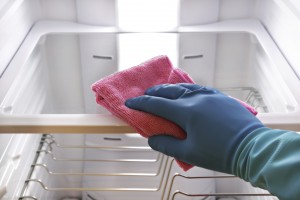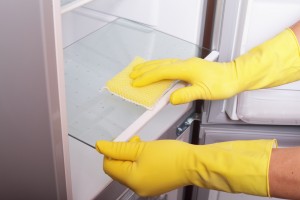
Fridges
Many things can lead to an unsanitary fridge. Improper food storage, buying too much food and living with other people can all contribute to this. Shared fridges tend to be the ideal place for unwanted or forgotten food to hide away and spoil over time. If you have lived in student housing before, you will definitely be familiar with this. Since this appliance can easily become a trap for organic waste it is important to remain vigilant and to check your fridge for spoiled foods which may eventually stain your fridge or give it a bad smell.
How To
 Keeping fridges clean is tricky. Most fridges have certain features designed to help quicken the process. For instance, many have removable parts, such as shelves, or drawers. Bottom-drawers foreseen for vegetable storage often become messy and catch everything from above. Many fridges allow you to remove these for easy cleaning. Take these out and clean with warm soapy water. Wipe dry with a cloth.
Keeping fridges clean is tricky. Most fridges have certain features designed to help quicken the process. For instance, many have removable parts, such as shelves, or drawers. Bottom-drawers foreseen for vegetable storage often become messy and catch everything from above. Many fridges allow you to remove these for easy cleaning. Take these out and clean with warm soapy water. Wipe dry with a cloth.
Regular dish-soap or water and vinegar mixtures are great for frequent cleaning. Natural products are generally safer to use when your fridge is primarily used for food storage. Avoid using harsh chemical cleaners inside your fridge to avoid contaminating your food, unless you are doing a very thorough cleaning of the entire appliance. If serious staining occurs, consider turning off your appliance for its yearly cleaning, or clear and then cover the affected space (for ex: the entire shelf) with a cloth soaked in warm water and Vim. The stain will loosen. Clean carefully with the same mixture or a lighter product.
Industrial fridges will take more time to clean, depending on what is normally stored in there. For heavy-duty cleaning jobs, mixing a few teaspoons of isopropyl alcohol with warm water is highly effective. After clearing the fridge, add a few drops of isopropyl alcohol to a large spray-container and spray it down, before thoroughly cleaning.
There are a few ways to deal with bad smells:
- Avoid leaving smelly foods uncovered and dispose of them upon expiry.
- Leave an uncovered bowl of milk overnight in the fridge.
- Leave baking soda out on a dish; change every month or more.
- Leave coffee grounds out on a dish overnight.
- Clean fridge with vinegar and warm water.
- Mix 4 cups of hot water with 2 Tbsp.’s of baking soda. Wash inside of fridge twice and then dry off
Tips & Takeaways

Your fridge can get dirty through improper food handling. This can help spread food-borne bacteria which may lead to illness. Prevent stains and cross-contamination by making sure sauces and other ingredients that leak easily are properly washed off and closed before storing. If you are thawing something, put it on a plate or in a bag. Improper storage of fruits and vegetables can sully your fridge as they decompose or harden. Know what is in your fridge and get rid of expired items right away. Harsh chemical cleaners can be absorbed by your food. By practicing proper food handling and using natural cleaners as often as possible you can avoid contaminating your food.
Proper maintenance requires turning off the fridge and defrosting it at least yearly. This also allows you to air it out, which normally is not an option. As with anything, certain spots get dirtier than others. Remember to clean door handles and seals frequently to prevent staining and tougher jobs in the future. CIF is a strong and effective cleaning product, good for quickly cleaning tough stains, as well as for in-depth cleaning while the fridge is off. Use Vim when natural cleaners are not enough.